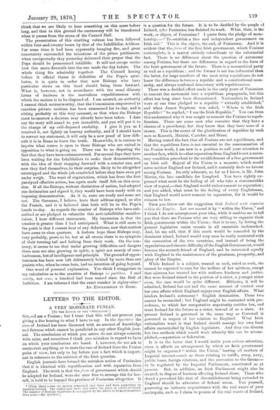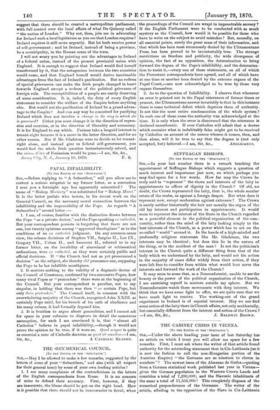LETTERS TO THE EDITOR.
A VERY MODERATE FENIAN.
(TO THIS EDITOR OF THE .SPECTATOU:1
Sin, —I am a Fenian ; but I trust that this will not prevent you giving a due hearing to what I have to say. In the Spectator the case of Ireland has been discussed with an amount of knowledge and fairness which cannot be paralleled in any other English jour- nal. The conclusions at which you arrive do not always coincide with mine, and sometimes I think you mistaken in regard to facts on which your conclusions are based. I, however, do not ask to controvert anything, or to state the case of Ireland from the Fenian point of view, but only to lay before you a fact which is import- ant in reference to the solution of the Irish question.
English journals have formed the mistaken notion of Fenianism that it is identical with republicanism and with separation from England. The truth is that the form of government which should be adopted for Ireland, were she once free to arrange this for her- self, is held to be beyond the province of Fenianism altogether. It
* [Very likely ;—but we merely remarked that there had been apparently no material increase. The eighty-Dine have only taken the place of others deceased. The number of Bishops in partibus do not appear by the Diario to be more numerous than usual.—En. Spectator.' is a question for the future. It is to be decided by the people cf Ireland, after Fenianism has finished its work. What, then, is the work, or object, of Fenianism? I quote from the pledge of mem- bership :-6".ro establish a free and independent government on Irish soil." This is the object, the end, of Fenianisw. And it is evident that the inn of the free Irish government, which Fenians contemplate, is a matter entirely subordinate to the substantial fact. There is no difference about the question of autonomy among Fenians, but there are differences in regard to the form of the Irish government of the future. There is a monarchical party as well as a republican ; and the former is not less influential than the latter, for large numbers of the most noisy republicans do not know the difference between a republic and a constitutional mon- archy, and always confound democracy with- republicanism.
There was a decided effort wade in the early years of Fenianism to convert the movement into a republican propaganda, but this effort has long since been discontinued. Nationalists in Ireland were at one time pledged to a republic "virtually established," and when James Stephens was asked, "Where is the Irish Republic?" lie replied, "I am the Irish Republic." You can from this understand why it was sought to commit the Fenians to repub- licanism. There are some men who conceive that they have a chance of a presidency, but they know that they have none of a crown. This is the secret of the glorification of republics by such men as Kossuth, Mazzini, Castelar, and Blanc.
Having stated the fact that all Fenians are not republicans, and that the republican form is not essential to the consummation of the Fenian work, I am now in a position to call your attention to another fact, which is—that separation from England is not a neces- sary condition precedent to the establishment of a free government on Irish soil. Repeal of the Union is a measure which would serve neither England nor Ireland, and it certainly finds no favour among Fenians. Its only advocate, so far as I know, is Mr. John Martin, the late candidate for Longford. You have rightly ex- pressed what must be the feeling of all who take a statesmanlike view of repeal,—that England would rather consent to separation ; and you added, what must be the feeling of every Englishman, that England would never consent to separation, for it would be ruinous to her.
Then you threw out the suggestion that Ireland must organize within the Empire. Let me amend it by "within the Union," and I think I do not misrepresent your idea, while it enables me to tell you that there are Fenians who arc very willing to organize their Irish government within the Union ; that is to say, by letting the present legislative union remain in all essentials undisturbed. And, let me add, that if this much would be conceded by the dominant island, Ireland would very soon be really contented with the connection of the two countries, and instead of being the opprobrium and chronic difficulty of the English Government, would become the staunch friend of England, and be interested equally with England in the maintenance of the greatness, prosperity, and glory of the Empire.
While Ireland is a subject, treated as such, ruled as such, she cannot be expected to care for the welfare of her mistress, except that mistress has treated her with uniform kindness and justice. But were Ireland raised to the position of a sister, a younger sister even, the case would be quite different. Hitherto, it will be admitted, Ireland has not bad the same amount of control over her own affairs which England enjoys over English affairs. What binders Ireland's autonomy? English domination. These two cannot be reconciled ; but England might be contented with pre- cedence, to which her comparative superiority entitles her, and treat Ireland for the future as a sister, instead of as a slave. At present Ireland is governed in the same way as Cornwall is governed in respect of her relation to England. What Irish nationalists want is that Ireland should manage her own local affairs uncontrolled by English legislators. And they can discern but two methods which would work whereby this can be accom- plished,—separation or federation.
It is to the latter that I would invite your serious attention, since it affords an arrangement by which an Irish government might be organized "within the Union," leaving all matters of
Imperial interest—such as those relating to tariffs, army, navy, public loans, foreign relations, and the succession to the throne—
to be regulated by the Imperial Parliament, constituted as at present. But, in addition, an Irish Parliament might also be created, to dispose of business affecting Ireland alone. Those who dread a precedent like that of disestablishment being extended to England should be advocates of federal union. You yourself, possessing an intimate acquaintance with the real wants of your metropolis, such as I claim to possess of the real wants of Ireland, suggest that there should be created a metropolitan parliament, with full control over the local affairs of what De Quincey called "the nation of London." Why not, then, join me in advocating for Ireland such a local legislature as you see that London requires? Ireland requires it still more urgently. But let both receive power of self-government ; and let Ireland, instead of being a province, be a municipality, in the Roman sense of the term.
I will not weary you by pointing out the advantages to Ireland of a federal union, instead of the present provincial union with England. It is enough to suggest that Ireland would find herself transformed by it, that the antagonism between the two countries would cease, and that England herself would derive inestimable advantages from the fact of Ireland's pacification. But no redress of special grievances can make the Irish people changed in heart towards England except a redress of the political grievance of foreign rule. The susceptibilities of a people are surely deserving of some consideration. It is, indeed, the duty of every English statesman to consider the welfare of the Empire before anything else. But would not the pacification of Ireland be a grand advan- tage to the Empire ? And can any way be conceived for pacifying Ireland which does not involve a change in the way in which she is governed? Either you must change it in the direction of repres- sion and coercion, or in the direction of liberality and autonomy. It is for England to say which. Fenians take a languid interest in tenant-right because it is a move in the latter direction, and for no other reason. But if Mr. Gladstone were to decide to let tenant- right alone, and instead give us federal self-government, you would find the whole Irish question instantaneously solved, and the raison d'47tre of Fenianism would be gone.-1 am, Sir, &c.,
Jersey City, N. J., January 10, 1870. F. S.



































 Previous page
Previous page